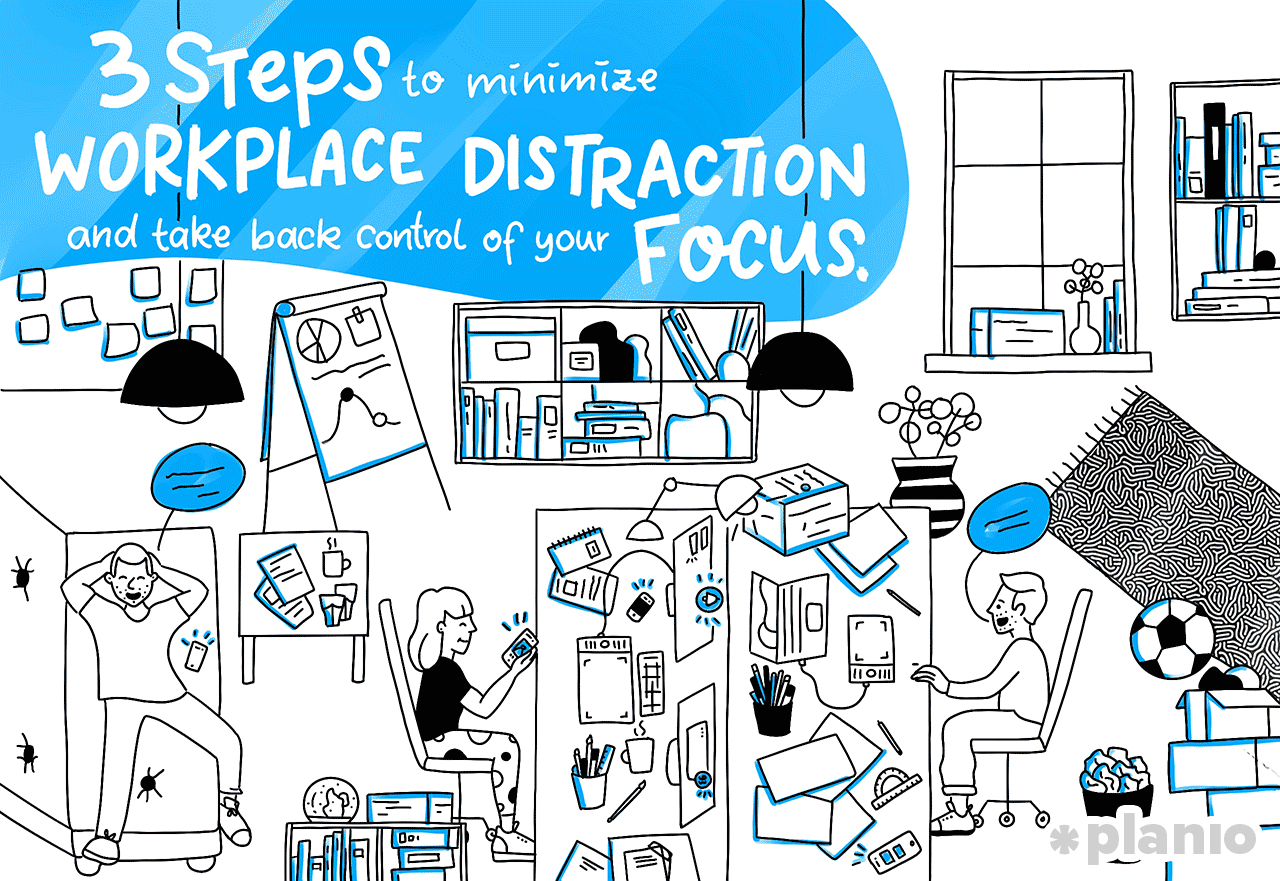
How to Minimize Distractions and Stay Focused

Mastering the Mind: How to Minimize Distractions and Stay Focused
In our ever-connected, fast-paced world, distractions are the bane of our existence. From the insistent ping of our phones to the siren call of social media, it's a constant struggle to maintain focus and get things done. But amidst the noise, there's a quiet power within us: the ability to cultivate focus and silence the distractions. This article delves into the strategies and techniques to help you master your mind and reclaim your focus.
Understanding the Enemy: The Science of Distractions
Our brains are wired for novelty. We're naturally drawn to anything that sparks our attention, especially bright, flashing stimuli. This is a survival instinct, honed over millennia to keep us alert to potential threats. In today's environment, however, this innate tendency works against us, leaving us vulnerable to the constant barrage of notifications, updates, and the siren song of the internet.
The biggest culprits of distraction fall into two categories: external and internal.
- External Distractions: These are the obvious offenders: noisy environments, messy workspaces, intrusive technology, and even the tempting allure of a good book when you should be tackling a challenging task.
- Internal Distractions: These are the mental whispers that can be just as powerful as external stimuli. These include worries, daydreams, anxieties, and even the constant mental chatter that keeps our minds buzzing.
The Power of Mindfulness: Reclaiming Your Attention
The key to conquering distractions lies in learning to manage your attention. Mindfulness plays a crucial role. Mindfulness is the practice of paying attention to the present moment without judgment. It's about becoming aware of your thoughts, feelings, and sensations without getting caught up in them.
Practical Strategies to Minimize Distractions:
1. Conquer Your Environment:
- Create a Dedicated Workspace: A dedicated space, free from clutter and distractions, can help you enter "work mode" and signal to your brain that it's time to focus.
- Eliminate Visual Distractions: Turn off notifications, close unnecessary tabs, and consider using website blockers to prevent yourself from getting sucked into social media rabbit holes.
- Control Noise: Use noise-canceling headphones, white noise machines, or even just a playlist of instrumental music to create a calmer, more focused environment.
2. Tame Your Technology:
- Digital Detox: Schedule regular breaks from screens and social media. These "digital detox" periods can help you reset your attention and reduce the allure of your devices.
- Mindful Phone Use: Instead of mindlessly scrolling, consciously choose when and how to use your phone. Consider setting aside specific times for checking emails or social media.
- Utilize Technology Tools: Use apps and software designed to block distracting websites, limit screen time, or even track your focus levels.
3. Embrace the Power of Breaks:
- The Pomodoro Technique: This technique involves working in 25-minute intervals with short breaks in between. It helps to maintain focus and prevents burnout.
- Short, Frequent Breaks: Step away from your work every hour or so for a few minutes to stretch, move around, or simply close your eyes and clear your head.
- Change of Scenery: Sometimes, a change of environment can be just what you need to refocus. Take a walk in nature, work from a coffee shop, or simply move to a different room.
4. Cultivate Mental Discipline:
- Mindfulness Meditation: Regular meditation practice can help you develop a greater awareness of your thoughts and feelings, allowing you to observe distractions without getting swept away by them.
- Focused Breathing: Simple breathing exercises can help calm your mind and bring your attention back to the present moment.
- Journaling: Writing down your thoughts and feelings can help to clear your mind and create space for focused work.
5. Optimize Your Work Flow:
- Break Down Large Tasks: Overwhelmed by a massive project? Divide it into smaller, manageable chunks. This makes the task seem less daunting and makes progress feel more rewarding.
- Prioritize Tasks: Identify the most important tasks and focus on those first. Avoid multitasking, as it can lead to decreased productivity and increased distractions.
- Reward Yourself: Recognize your accomplishments and reward yourself for achieving your goals. This positive reinforcement helps to maintain motivation and focus.
Focus: A Journey, Not a Destination
Improving your focus is a journey, not a destination. There will be times when you find yourself distracted, but don't get discouraged. The key is to be aware of your distractions, learn from them, and develop strategies to minimize their impact.
By embracing these strategies, you can reclaim your focus and unlock your true potential. You'll find yourself more productive, more engaged, and ultimately, more fulfilled. It's time to quiet the noise and step into a world of focused clarity.

Here’s more about the topic discussed above:
The Art of Focus: Mastering the Distractions of the Modern Age
In our hyper-connected world, distractions are constant companions. Notifications ping, emails flood our inboxes, and social media beckons with its seductive allure. Maintaining focus amidst this digital cacophony is a Herculean task, yet it is a skill crucial for productivity, creativity, and even mental well-being. This article explores a comprehensive approach to minimizing distractions and cultivating unwavering focus.
Understanding the Nature of Distractions:
Distractions can be broadly classified into internal and external. Internal distractions stem from our own minds: daydreaming, anxiety, boredom, and even our desire to multitask. External distractions are those that originate from our environment: noisy neighbors, a cluttered workspace, or the insistent buzz of a smartphone.
Conquering Internal Distractions:
- Mindfulness Meditation: This ancient practice teaches us to observe our thoughts and feelings without judgment. Regular meditation helps train the mind to focus on the present moment and let go of intrusive thoughts.
- Setting Clear Intentions: Before embarking on any task, clearly define your goals and the desired outcome. This anchors your attention and helps you resist the temptation to deviate.
- Timeboxing: Assign specific time blocks for different tasks. This structure helps you avoid mental fatigue and prevents the temptation to multitask, which actually reduces efficiency.
- Breaks and Recharge: Regular breaks are essential for maintaining focus. Short, strategic breaks allow your mind to rest and return refreshed, ready to tackle the task at hand.
Taming External Distractions:
- Create a Focused Environment: Design a workspace that minimizes visual and auditory distractions. A clean and organized space promotes clarity and focus.
- Silence the Siren Call: Turn off notifications on your phone and computer. Consider using apps like Freedom or Stay Focused to block access to distracting websites during dedicated work periods.
- Embrace the Power of "No": Learn to politely decline requests or invitations that threaten your focused time. It's okay to prioritize your work and personal commitments.
- The Pomodoro Technique: This time management method utilizes 25-minute work sessions interspersed with short breaks. This cyclical pattern helps maintain focus and prevent burnout.
Strategies for Enhanced Focus:
- Prioritize and Delegate: Identify the most important tasks and tackle them first. Delegate less critical tasks or outsource them to free up your time and energy.
- The "Single-Tasking" Approach: Focus on one task at a time. Resist the urge to multitask, as studies show it reduces productivity and increases errors.
- Leverage the Power of "Flow": When you fully immerse yourself in a task, you enter a state of flow, where time seems to disappear. This state of focused engagement is highly productive and enjoyable.
- Harness the Benefits of Sleep and Exercise: Adequate sleep and regular physical activity are essential for cognitive function and focus.
Cultivating Focus: A Continuous Journey:
Mastering focus is an ongoing journey. It requires patience, self-awareness, and a willingness to experiment with different techniques. What works for one person may not work for another, so find the strategies that best suit your individual needs and personality.
Beyond the Basics:
- Mindful Technology Usage: While technology can be a distraction, it can also be a tool for improving focus. Utilize apps that enhance concentration, such as those that offer noise cancellation or block distracting websites.
- Embrace the Power of Habit: By consistently applying these strategies, you can create habits that naturally promote focus. Repetition and consistency are key to overcoming procrastination and distractions.
- Seek Support: Don't hesitate to seek help from a therapist or coach if you struggle with focus. They can provide personalized guidance and strategies tailored to your specific challenges.
In a world overflowing with distractions, cultivating focus is a valuable skill that can unlock your potential and lead to a more fulfilling and productive life. By implementing the strategies outlined in this article, you can learn to control the distractions, stay focused, and achieve your goals. Remember, focus is not a destination but a journey; one that requires constant effort and mindful attention, but ultimately leads to a more fulfilling and successful life.
